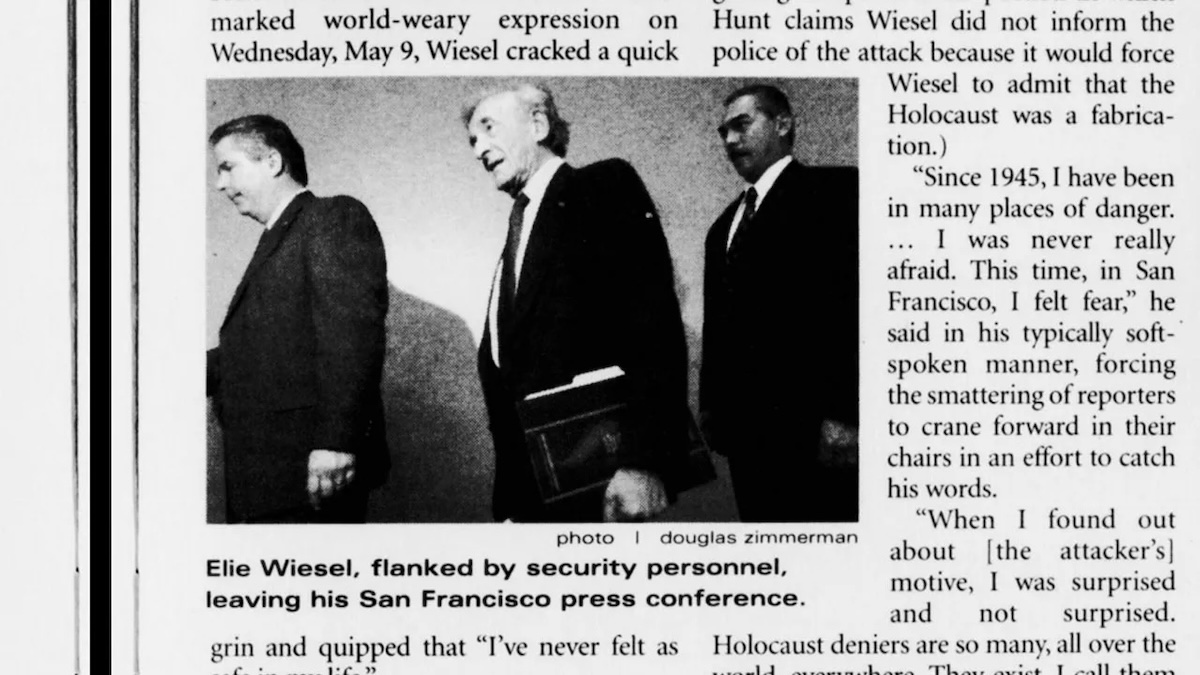By Maya Mirsky | J The Jewish News of Northern California
In 2007, the San Francisco district attorney handled a noteworthy criminal case that was making international headlines. Kamala Harris is today the Democratic Party’s presumptive nominee for president, but 17 years ago, she was serving in her first elected position as DA, responsible for prosecuting an antisemitic incident that shook the city — and the Jewish world.
Author, peace activist, Holocaust survivor and Nobel laureate Elie Wiesel had been attacked in San Francisco.
On a dark February evening, Wiesel was returning to his room at the Argent Hotel on Third Street after a peace conference. A 22-year-old antisemite and Holocaust denier named Eric Hunt followed Wiesel and dragged the 78-year-old out of the elevator and down the hall. In Hunt’s own post on an antisemitic website, he said he’d been trailing Wiesel for weeks and was going to force the celebrated author to “admit” the Holocaust was untrue.
After Wiesel called for help, Hunt ran. Wiesel said later that the incident was deeply upsetting, as was Hunt’s denial of the horrors Wiesel had lived through.
“To negate someone’s memory is a violation of that person’s humanity,” he said.
A few weeks after the attack, we reported on Hunt’s apprehension. “Acting at the behest of the San Francisco Police Department, New Jersey police arrested Eric Hunt at a mental health treatment center in Belle Mead, N.J., on Saturday, Feb. 17. Hunt, 22, had voluntarily checked into the facility. He is being charged with attempted kidnapping, false imprisonment, elder abuse, stalking, battery and committing the aforementioned hate crime.”
Hunt was extradited to California from New Jersey and went to trial in July 2008 in San Francisco (the Superior Court judge was Harold Kahn). Harris’ office decided to charge Hunt not only with kidnapping, stalking and elder abuse, but also with a hate crime.
“The hate crime designation gratified Jonathan Bernstein, regional director of the Anti-Defamation League,” we reported. “‘It’s clear the assailant wanted to send a message beyond just Elie Wiesel but to the entire Jewish community and beyond. So it’s important for society to send a message back to him and other would-be perpetrators of hate crimes,’ he said.”
Hunt pleaded insanity at his trial, while his lawyer admitted that his client had been following Wiesel across the country as he went on a speaking tour.
“With a calm dignity, the 79-year-old Wiesel took the stand July 7 and 8 to recount the details of the February 2007 run-in with an assailant who wanted Wiesel to declare that his Holocaust memoir ‘Night’ was a work of fiction,” staff writer Greg M. Schwartz reported.
“During direct examination, Wiesel said, ‘ are not only unfair and unjust, but they are ugly. I don’t know how to respond to ugliness.’”
Hunt was convicted on one felony charge of false imprisonment with a hate crime enhancement and misdemeanor counts for battery and elder abuse. He was sentenced in August 2008 to two years in prison, but released after sentencing for time served, on probation, with the stipulation he get psychiatric treatment.
DA Harris released a statement on Hunt’s conviction, and why her office chose to charge the attack as a hate crime.
“Crimes motivated by hate are among the most reprehensible offenses. This defendant has been made to answer for an unwarranted and biased attack on a man who has dedicated his life to peace.”
The ADL also felt that fixing the incident as a hate crime was “what was really important,” even though Hunt was being released.
As staff writer Joe Eskenazi reported during the trial, “Following the hearing, Hunt’s weeping mother, Naomi McCloskey, approached Wiesel, asking for his forgiveness and referring to Hunt as a ‘kind boy, a sensitive boy.’ ‘I was touched by his mother,’ Wiesel told j. ‘I told her I understood her pain. But what can I do? It is sad, because she is also his victim.’”
Though Hunt’s defense took the line that the act was because of mental illness and not antisemitism, with the defense attorney saying his client “had no history with organized hate groups or anti-Semitism before a psychotic breakdown due to an undiagnosed bipolar disorder,” a year after his release Hunt was already harassing another Holocaust survivor over supposed “lies.” He, or someone using his name, was posting on Twitter in 2009 about that harassment, as well as about Elie Wiesel and in praise of notorious Holocaust denier David Irving.
A few months after the attack, in May 2007, Eskenazi covered Wiesel’s first return to San Francisco.
“’Since 1945, I have been in many places of danger. … I was never really afraid,’ Wiesel said at a press conference. ‘This time, in San Francisco, I felt fear,’ he said in his typically softspoken manner, forcing the smattering of reporters to crane forward in their chairs in an effort to catch his words. ‘When I found out about motive, I was surprised and not surprised. Holocaust deniers are so many, all over the world, everywhere. They exist. I call them not mentally ill, but morally ill.’”
This content is republished with permission from J. The Jewish News of Northern California. © 2023 San Francisco Jewish Publications, Inc. All rights reserved. J.’s content can be found at https://jweekly.com
This resource is supported in whole or in part by funding provided by the State of California, administered by the California State Library in partnership with the California Department of Social Services and the California Commission on Asian and Pacific Islander American Affairs as part of the Stop the Hate program. To report a hate incident or hate crime and get support, go to CA vs Hate.












